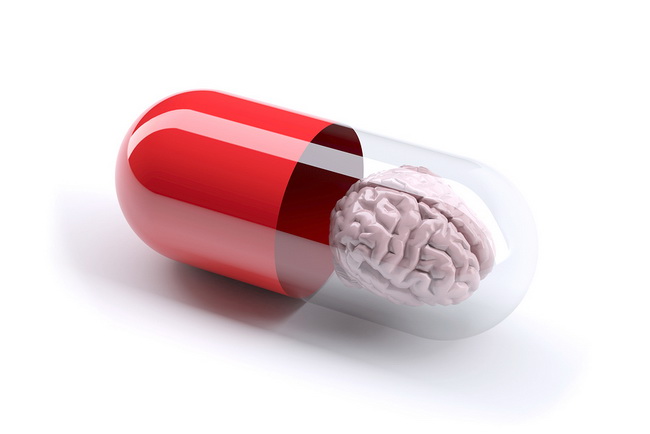- Make It Yourself Lavender Heart-Shaped Bath Bombs!
- 20 Things You Never Knew About “Down There”
- 12 Best Foods For Those Suffering From Arthritis Pain
- 12 Personal Hygiene Mistakes Almost Everyone Makes (Mom Never Told You About #4!)
- 15 Medicinal Plants And Herbs From The Cherokee People
- 12 Mind-Blowing Benefits Of Drinking Coconut Water During Pregnancy
- 12 Outstanding Winter Foods That Won’t Fatten You Up Like A Christmas Turkey
Smart Pills: Would You Try Them?

Photo credit: bigstock.com
You have probably heard those estimates from scientists that we only use between 10 and 20 percent of our brain. Has science now made it possible for us to use much more that from the mere consumption of a pill?
In case you haven’t heard, there are now a number of what are being called “smart pills” or “smart drugs,” and they have garnered a great deal of attention lately. Everything from stimulants such as modafinil to amphetamines (known by the brand name Adderall) and methylphenidate (Ritalin) has become available. According to news reports, students who begin taking these drugs to improve their cognitive performance in college continue to take them in their professional lives.
If you have seen the film “Limitless,” where a man is literally transformed into a super-thinking human by taking a (fictitious) drug, then you have a small idea about how these drugs are supposed to work. Of course, unlike the film, you won’t learn to play the piano like a pro in three days, and you probably won’t write a best-selling novel in less than a week, but those who use them claim that they really do feel like a super computer.
We really should be asking ourselves, however, if these smart pills are all they are cracked up to be. Are they safe? What exactly can these pills do for us or not do for us? Do they really make us smarter, or are we simply able to concentrate for longer periods of time?
Let’s take a look at these so-called smart pills.
First, although smart pills will improve your focus, they won’t make you smarter. For some people, these are abstract concepts, but there is no doubt that there is a kind of grey area between knowledge and how the brain works. Being able to think about things that are not immediately stimulating your senses is the very fundamental of abstraction. The prefrontal cortex at the front of our brain is what helps us to think in abstract (such as the future, even if that future is just minutes away) terms. Our prefrontal cortex makes these thoughts about abstract concepts by making little pyramidal cells. These little pyramids start feeding each other, and they keep each other going by firing off little neurons. They can keep each other firing off, even when there is no more information coming in from the environment to stimulate themselves. When we get stressed or tired, chemical influences occur that disconnect those circuits. This is where things like nicotine and caffeine restore function to those circuits.
So taking smart drugs will keep those neurons firing and exciting one another, but it won’t turn you into Einstein.
Continue to Page 2

Photo credit: bigstock.com
Some students who use these smart drugs say that it makes their studying more pleasurable and easier. Since some students take these drugs and do better on tests, will this put pressure on other students to do the same in order to compete?
A professor at the University of Michigan, Dr. Martin Sarter, says that these drugs do not so much improve cognition, but they do enable the user to focus for longer periods of time.
One student told a researcher that he got completely absorbed in one book after another and that he began making connections between the ideas in these books. He said that he found the entire process really enjoyable, putting together ideas in ways that he had not been able to do before he started taking smart pills.
These smart pills sound wonderful, but are they harmless? Our brains are complicated pieces of machinery that we do not fully understand. In trying to do an “upgrade,” will we upset the brain’s natural balance? Professor of Cognitive Neuroscience at the University of Cambridge, Trevor Robbins, says that it is possible to affect the memory and focus with pharmacological substances, but keeping them safe is another story. There are costs that come with narrowing your attention. By making your focus more intense, it narrows the range and scope of associations, and things in your periphery, which you could bring into your process. So, while this may not be a big problem for students who are contemplating the meaning of life, for police dispatchers or air traffic controllers, this could be devastating. Improving one aspect of your brain function might put a damper on other aspects.
As of today, we don’t have drugs that will produce a general, cortex wide expansion of our brain power. Perhaps in the future, but not as of now.
Continue to Page 3

Photo credit: bigstock.com
Is there a future in smart drugs? Of course. Memory improvement appears to be on the horizon, and lengthening our attention span is almost here. Nicotine receptor agents, which are neurotransmitter receptors that respond to nicotine, act on mechanisms that control our attention span. Many scientists believe that these nicotine-based substances might be the next true cognition enhancers.
As for long term health risks, the truth of the matter is that we just don’t know. Health experts are concerned about reported side effects, such as increases in blood pressure, headaches, nausea, and feelings of anxiety. Many doctors will not prescribe these pills as they feel that people are simply putting their health at risk for the sake of trying to become smarter.
Of course, if you are wary of these so called smart pills (and everyone should be!),then you can always improve your grey matter the old fashioned way: By consuming brain-improving foods and practicing cognitive measures known to keep the brain working at its best without chemical agents.
The Best foods for improving the brain function:
1. Gingko Biloba
Used for thousands of years to improve circulation, and improves blood flow to the brain. Read more about gingko biloba benefits.
2. B Vitamins
The body needs B vitamins to produce normal and healthy levels of brain chemicals. You can take a B complex vitamin supplement and consume more foods that are rich in B vitamins, such as dark green leafy vegetables, nuts, fruits, chicken, and whole grains.
3. Fish oil
Numerous studies have shown that the omega-3 fatty acids in cold water fish, such as tuna and salmon, slow the deterioration of brain cells as we get older. Work to eat a minimum of two servings of fish each week, or take fish oil or krill oil supplements.
Continue to Page 4

Photo credit: bigstock.com
Top ways to give your brain a workout
1. Learn something new
Following your own natural curiosity can lead to innovation, creativity, and new ideas. Try to learn a new skill at least six times a year. Take dancing lessons, an art class, or an online class of your choosing. Learning something new stimulates our brain to build new cells.
2. Play with clay
This might sound a little strange, but playing around with clay has been shown to improve the imagination. You don’t have to go all out making glazed pottery! Just keep some of your kids modeling clay in your desk drawer or your home office, and have some fun squishing it and making new shapes.
SEE ALSO: 12 Foods to Protect Your Brain from Aging and Dementia
3. Change things up
Doing the same things in the same ways makes your brain get lazy. Force your brain to fire things up by driving a new way to work. Turn off the lights, and try to find your way to your bedroom in the dark. Put on your clothes in a different order. Try a different recipe for your Friday night lasagna. Anything you do in a different way, no matter how small, forces your brain to work.
4. Look at things in a new light
Our brain is divided into two parts. The left side is for logic and reasoning, and the right side does our creative thinking. Most people switch between the two sides as needed, but why not try using both at the same time? Once a day, take a picture from your photo album or a magazine and turn it on its side or upside down. Our left brain is what assesses the image, but once we turn a picture over, it no longer makes sense to the left side, and the right side must chip in some information so the left side can understand what it is looking at.
Smart pills aren’t exactly what they appear to be, and the long term health effects are not yet known. They might help people to focus for longer periods of time but these really aren’t the best ways to improve intelligence and get ahead in life. Chemical drugs ALWAYS extract a cost, and they are rarely worth it.
References:
































